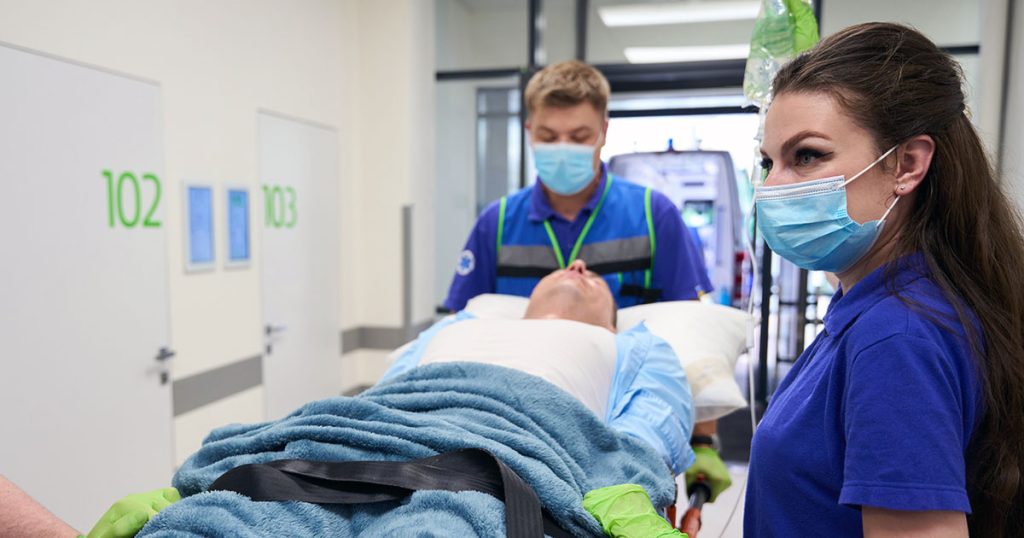Capitalise on your emergency department experience to get an advanced nursing qualification.

Course Outline
If you work in an emergency department or similar setting, a Master's in Emergency Nursing can elevate your nursing practice. Program participants learn to manage time-critical cases such as trauma, acute illnesses, and accident care. You'll develop expertise in rapid assessment, patient prioritisation, and measured decision-making.
The course includes core subjects on general nursing practices along with emergency and critical care units and electives. It's designed for nurses looking to enhance their clinical skills and professional qualifications.
Completing the program positions you for advanced nursing jobs such as Clinical Nurse Specialist, Clinical Nurse Consultant and Nurse Unit Manager. You'll be well-placed to make a significant impact in dynamic emergency settings, ready to lead and innovate in this field.
How Do I Become an Emergency Nurse in Australia?

Working as an RN in an emergency department is the way to become an emergency nurse. However, further study will be needed to progress your career. Here are the steps involved.
Step 1: Become an RN
To be an emergency nurse, start by qualifying as a Registered Nurse (RN). To do this, complete a Bachelor of Nursing or, if you have a degree in another field, a Master of Nursing Practice. Once qualified and registered, gain hands-on experience in an emergency department, where you'll learn to quickly assess, triage, and treat patients facing urgent and life-threatening conditions.
Step 2: Gain experience and qualifications
Further specialisation is key. This may involve undertaking additional certifications like a Graduate Certificate in Emergency Nursing, focusing on skills such as trauma management, triage processes, and critical paediatric care. Continuous professional development will hone your skills in emergency scenarios. Clinical Nurse Specialist jobs are open to nurses with emergency nursing certification.
Related: Nursing Certification Programs in Australia
Step 3: Do a masters degree
Advance your qualifications with a relevant Masters of Nursing, such as in Emergency or Critical Care Nursing, to further elevate your career prospects. Apart from the knowledge benefits, this will open doors to roles like Clinical Nurse Consultant, Clinical Nurse Educator and Nurse Unit Manager.
Related: How to Become an Emergency Nurse
What Is an Emergency Nurse Practitioner?

An Emergency Nurse Practitioner is an RN specialising in emergency medicine with a Master of Nurse Practitioner or equivalent qualification. These medical professionals have been endorsed by the Nursing and Midwifery Board of Australia after gaining significant clinical experience in emergency care settings.
NPs have an expanded scope of practice that allows them to handle urgent and life-threatening conditions in emergency departments with significant autonomy. They are qualified to assess patients, diagnose conditions, order and interpret diagnostic tests, and develop treatment plans. Additionally, NPs are authorised to prescribe medications, refer patients to specialists, and manage patient admissions and discharges.
Related: How to Become a Nurse Practitioner in Australia
Is This Degree Worth It?

Yes, a Master of Nursing (Emergency Nursing) is a valuable investment for nurses aiming to excel in emergency care. It enables career progression, which can be both personally satisfying and financially rewarding. And getting the degree may be easier than you imagine.
With an MN in this field, you are well-positioned for specialised roles that offer higher salaries. While the average emergency nurse in Australia earns around $86,861 per year, an MN can lead to positions with earnings exceeding $107,000 annually. Clinical nurse specialist positions are easily within reach with the degree, as well as advanced nursing roles at even higher pay grades.
Studying online on a part-time basis would avoid travel costs and any loss in earnings. The course content, closely related to your existing role, may be more engaging and easier to understand than new subjects encountered during your bachelor studies. Getting an advanced degree is achievable if you're motivated and can manage your time well.